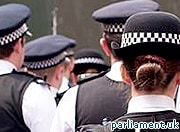Police officers will be told they are no longer able to arrest people just because others might find their words or behaviour “insulting”, in new guidance issued by the College of Policing.
Last year the Government agreed to remove the word “insulting” from Section 5 of the Public Order Act after the amendment was voted in by the House of Lords in December 2012.
The important free speech reform, backed by The Christian Institute, is to become law on 1 February and will be known as Section 57 of the Crime and Courts Act.
Insulting
“When the amendment comes into force”, the new College of Policing guidance states, “words or behaviour that are merely ‘insulting’, or the displaying of writing, signs or other visible representations which are merely ‘insulting’, within the hearing of someone likely to be caused harassment, alarm or distress, will no longer constitute a criminal offence under section 5(1).”
The campaign to change the law was spearheaded by the Reform Section 5 group, which united an unusual alliance including The Christian Institute, the National Secular Society, the Peter Tatchell Foundation, and other civil liberties groups concerned about free speech.
Supporters of the reform said the word “insulting” was at risk of being misinterpreted, and it had led to many unjust incidents of police interfering in free speech.
Woof
One protestor was arrested for calling Scientology a “cult”, someone else was arrested for saying “woof” to a dog, and another for calling a police horse “gay”.
Several Christians were arrested for peaceful and lawful street preaching, and one Christian couple were put on trial for criticising Islam.
The Government had initially resisted reform of the law, but gave way in January after the Lords voted for it and the then Director of Public Prosecutions said he had no objection.
Removed
Keir Starmer QC, who was Director of Public Prosecutions at the time, said “having now considered the case law in greater depth, we are unable to identify a case in which the alleged behaviour leading to conviction could not properly be characterised as ‘abusive’ as well as ‘insulting'”.
He added: “I therefore agree that the word ‘insulting’ could safely be removed without the risk of undermining the ability of the CPS to bring prosecutions”.

